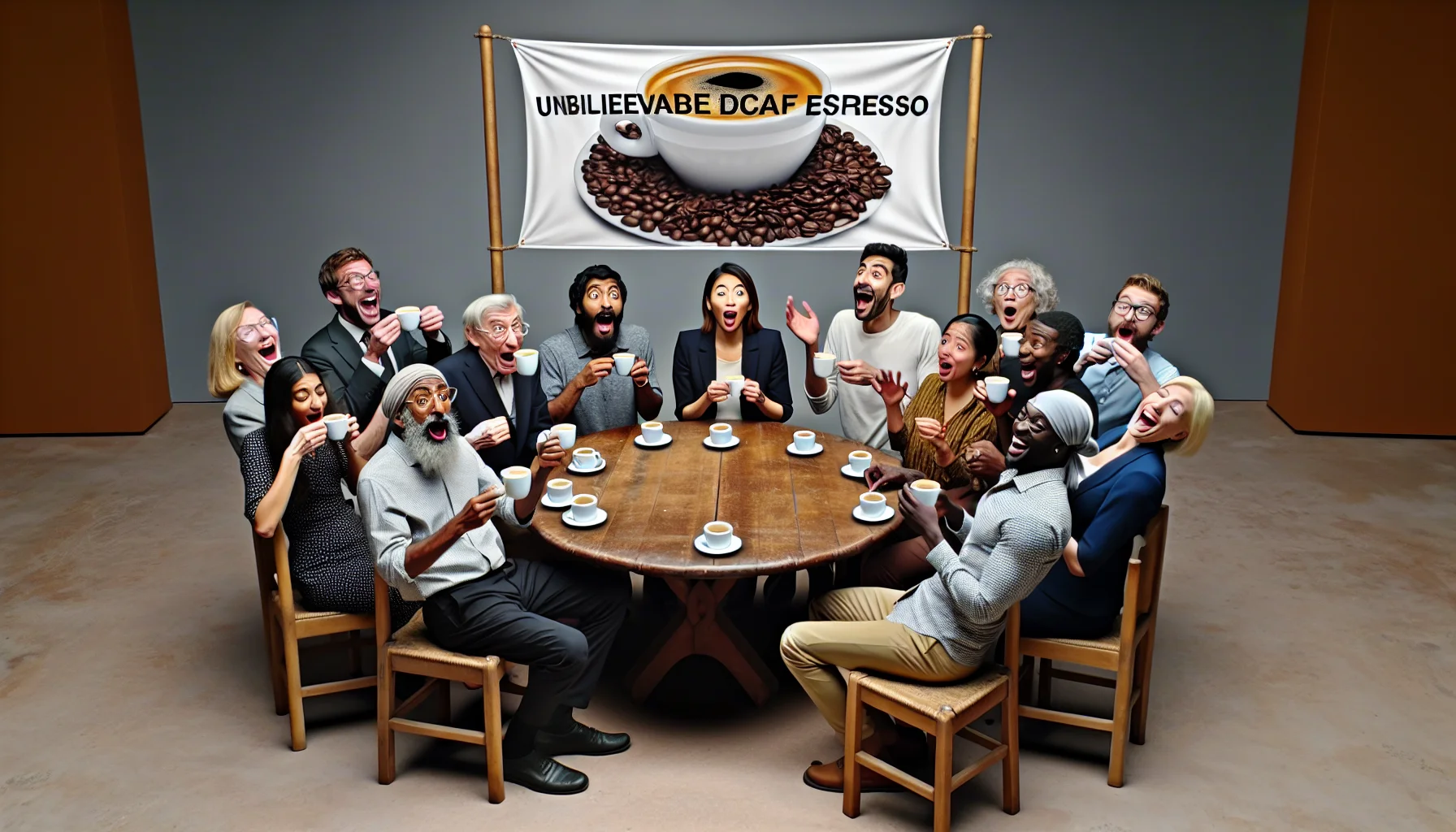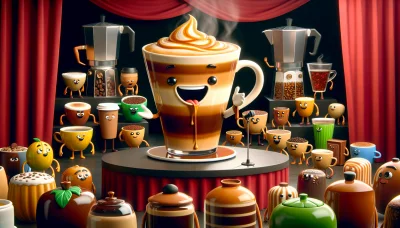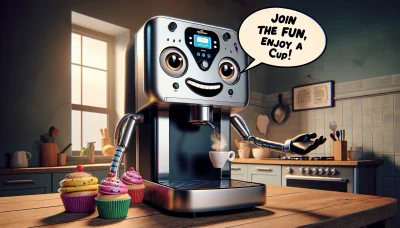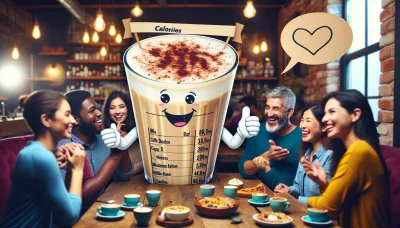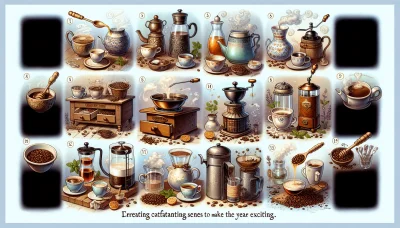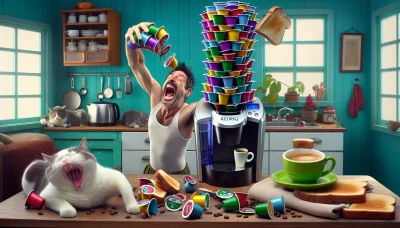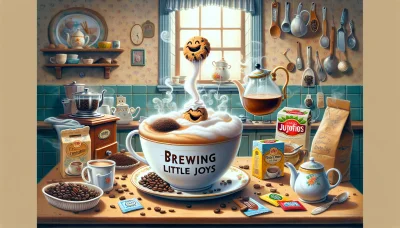Decaf espresso Quiz
Test Your Knowledge
Question of
Decaf Espresso: What You Need to Know
Decaf espresso is a type of coffee made using beans that have had at least 97% of their caffeine removed. The process of decaffeination does not significantly alter the beans' essential flavor and aroma characteristics, allowing coffee enthusiasts to enjoy a cup of espresso without the effects of caffeine. This makes it an ideal choice for those sensitive to caffeine or who wish to enjoy coffee later in the day without disrupting their sleep patterns.
The Process of Making Decaf Espresso
The process of making decaf espresso begins with the selection of coffee beans that have undergone a decaffeination process. This process usually involves soaking the beans in water to dissolve the caffeine, and then using a decaffeinating agent to remove it. Once the caffeine has been extracted, the beans are dried and roasted, similar to regular coffee beans. To make decaf espresso, these decaffeinated beans are then ground finely and packed tightly into an espresso machine's brewing chamber. Hot water is forced through the grounds at high pressure, extracting the coffee's flavors and oils to produce a rich, concentrated decaf espresso shot. This method ensures that coffee lovers can enjoy the deep, robust flavor of espresso without the effects of caffeine.
Benefits of Decaf Espresso
- Reduces risk of heart disease
- Lower caffeine content to avoid jitters and anxiety
- May improve sleep quality by reducing caffeine intake
- Contains antioxidants that help protect your cells
- May lower risk of type 2 diabetes
- Less likely to cause digestive issues
- Can be enjoyed later in the day without affecting sleep patterns
Popular Decaf Espresso Brands
| Brand | Price | Taste | Availability |
|---|---|---|---|
| Starbucks Decaf Espresso | $17.99 per pound | Rich and Caramelly | Widely available |
| Lavazza Dek | $20.00 per pound | Smooth and Creamy | Online and select stores |
| Illy Decaf | $15.99 per 8.8 ounces | Well-balanced, slightly sweet | Online and gourmet shops |
| Peet's Coffee Decaf Espresso | $17.95 per pound | Full-bodied and Bold | Online and Peet's Coffee locations |
How to Brew the Perfect Decaf Espresso at Home
To brew the perfect decaf espresso at home, start by selecting a high-quality decaf espresso bean. Grind the beans to a fine espresso grind just before brewing to ensure freshness. Heat your espresso machine to the proper temperature, which is typically between 195°F and 205°F. Use about 18 grams of your freshly ground coffee for a standard double shot. Tamp the grounds firmly and evenly to ensure even water distribution during extraction. Place the portafilter in your machine and start the brew. Aim for a brew time of 20-30 seconds. Once done, enjoy your decaf espresso as is, or use it as a base for lattes, cappuccinos, or other espresso-based drinks. Remember, the key to a great decaf espresso lies in the quality of the beans and precision in the brewing process.
Common Misconceptions About Decaf Espresso
- Decaf espresso is completely caffeine-free: Decaf does not mean caffeine-free. While decaf espresso has significantly less caffeine than regular espresso, it still contains small amounts.
- Decaf espresso tastes bland: The taste of decaf espresso largely depends on the quality of the beans and the method of decaffeination. High-quality decaf can taste just as good as regular espresso.
- Decaffeination uses harmful chemicals: Modern decaffeination processes, such as the Swiss Water Process or CO2 Process, use safe and natural methods to remove caffeine from coffee beans.
- Decaf is less healthy than regular coffee: Decaf espresso retains most of the antioxidants and nutrients found in regular coffee, making it just as healthy.
- Decaf espresso doesn't provide any energy boost: While the caffeine content is lower, decaf espresso can still provide a slight energy boost due to its small amount of caffeine and psychological effects.
Decaf Espresso vs Regular Espresso
| Aspect | Decaf Espresso | Regular Espresso |
|---|---|---|
| Taste | Similar to regular espresso but may have a slightly different flavor profile due to the decaffeination process. | Rich, robust flavor, with a slight bitterness and a creamy consistency. |
| Caffeine Content | Contains minimal caffeine, usually 1-7 mg per serving. | Contains significantly more caffeine, typically around 63 mg per serving. |
| Health Benefits | May be easier on the digestive system and better for those sensitive to caffeine. Can reduce risk of caffeine-related side effects. | Can improve mental alertness and physical performance. May have antioxidant properties and contribute to heart health. |
Expert Opinions on Decaf Espresso
Experts in the coffee industry have mixed opinions about decaf espresso. Some argue that decaffeination processes can strip away some of the coffee's natural flavors, leading to a less robust taste compared to regular espresso. However, advancements in decaffeination methods, such as the Swiss Water Process and Carbon Dioxide Process, have allowed for higher quality decaf espressos that retain much of the original flavor profile. Many professionals now acknowledge that with high-quality beans and proper brewing techniques, decaf espresso can satisfy even the most discerning coffee aficionados. The consensus is that while there may be slight differences in taste, decaf espresso remains a viable option for those looking to reduce caffeine intake without sacrificing their coffee experience.
Conclusion: Is Decaf Espresso Worth It?
In conclusion, whether decaf espresso is worth it depends largely on personal preference and the reasons behind choosing it over regular espresso. For those sensitive to caffeine or looking to reduce their caffeine intake, decaf espresso offers a wonderful alternative that retains much of the flavor and experience of traditional espresso without the stimulating effects. While some argue that the decaffeination process can slightly alter the taste and aroma, advancements in decaffeination methods have minimized these differences, making decaf options more appealing than ever. Ultimately, if you enjoy the ritual and taste of espresso but wish to avoid caffeine, decaf espresso is certainly worth considering.
